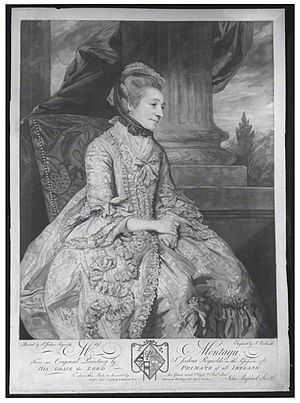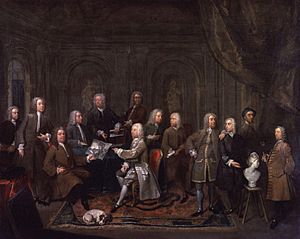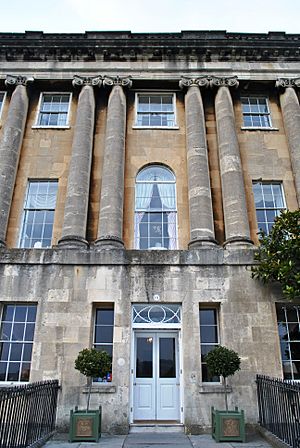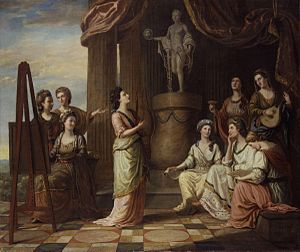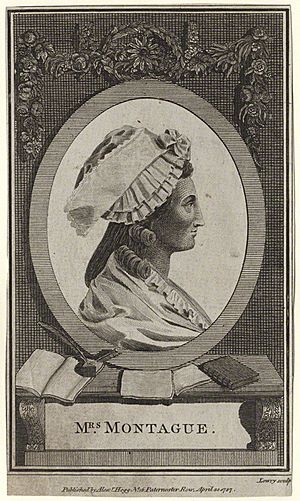Elizabeth Montagu facts for kids
Elizabeth Montagu (born Robinson; 2 October 1718 – 25 August 1800) was an important British woman. She was a social reformer, which means she worked to improve society. She also supported the arts and was a literary critic and writer. Elizabeth Montagu helped create and lead the famous Blue Stockings Society. Her family was wealthy and connected to important people in Britain. She was the sister of Sarah Scott, who wrote a book called A Description of Millenium Hall and the Country Adjacent. Elizabeth married Edward Montagu, who owned a lot of land. This made her one of the richest women of her time. She used her wealth to support English and Scottish writers and to help people who were poor.
Contents
Her Early Life
Elizabeth was born in Yorkshire. Her parents were Matthew Robinson and Elizabeth Drake. She was the oldest of three daughters. As a child, Elizabeth and her sister Sarah often stayed with their grandmother and her husband, Conyers Middleton. He was a well-known scholar from Cambridge. The girls learned Latin, French, and Italian. They also studied literature.
When she was young, Elizabeth became good friends with Lady Margaret Harley. They wrote to each other every week when they were apart. When they were together, they were inseparable. Elizabeth spent time with Lady Margaret in London. There, she met many famous people of the 1730s. These included the poet Edward Young. In Lady Margaret's home, men and women talked as equals. They shared clever and learned conversations. Mrs. Montagu later used this idea for her own famous gatherings.
Her Marriage and Life with Edward Montagu
In 1742, Elizabeth married Edward Montagu. He was a grandson of the Edward Montagu, 1st Earl of Sandwich. Edward owned many coal mines and large estates in Northumberland. Elizabeth was 22 years old and Edward was 50. This marriage was good for her social standing and wealth.
The next year, she had a son named John. She loved her child very much. Sadly, her son died unexpectedly in 1744. Elizabeth was heartbroken by this loss. After his death, she became much more religious. She and Edward remained friends throughout their marriage. They did not have any more children.
Most of the time, Elizabeth had a lady's companion with her. This person would help her with daily tasks.
Starting in 1750, Elizabeth and Edward had a routine. They would spend winters in London. In the spring, they would go to their home in Sandleford in Berkshire. Edward would then travel to Northumberland and Yorkshire to manage his properties. Elizabeth sometimes went with him to their family home at East Denton Hall.
Elizabeth was a very smart businesswoman. She managed her husband's coal mines and estates well. She was happy that the miners were afraid of losing their jobs. This fear, she noted, kept them "in order and regularity." She enjoyed hearing the miners sing. However, she found their local accent, called Geordie, "dreadful."
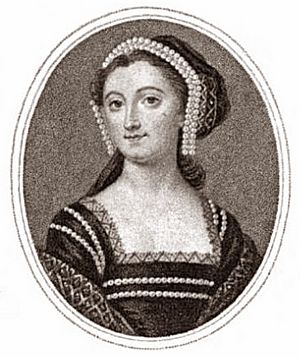
Her Famous Gatherings and Cultural Life
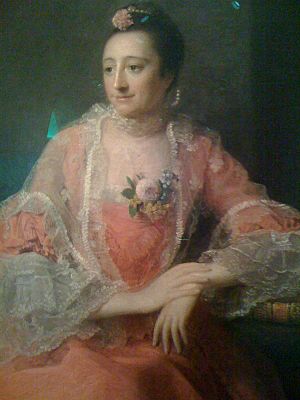
In London, Elizabeth became a famous hostess. She started by hosting literary breakfasts. By 1760, these had grown into large evening parties. At these gatherings, card playing and strong drinks were not allowed. These events became known as Blue Stocking meetings.
By 1770, Montagu's home in Hill Street was the most important salon in London. A salon was a regular gathering of important people, often for intellectual discussions. Famous people like Samuel Johnson, Sir Joshua Reynolds, and Horace Walpole were part of her group. For writers, being invited to her salon often meant getting financial support. Montagu supported many authors, including Elizabeth Carter, Hannah More, and Frances Burney.
Elizabeth Montagu was not the most outspoken person among the Blue Stockings. But she was the wealthiest. Her home, money, and influence made the society possible. She enjoyed the works of writers like Samuel Richardson and Fanny Burney. She was also happy to find out that Laurence Sterne was a distant relative.
Montagu also held similar events at her home in Royal Crescent, Bath.
Her Bluestocking Work and Writing
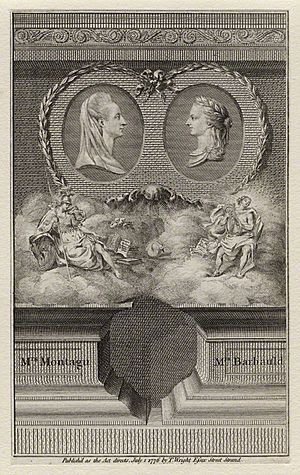
Elizabeth Montagu was called the "Queen of the Blues." She led and hosted the Blue Stockings Society in England starting around 1750. This was a group of wealthy women who were interested in education. They met to discuss literature and also invited educated men to join them. Talking about politics was not allowed. The main topics were literature and the arts. Many Bluestocking women supported each other in their intellectual activities. Many also published their own writings.
Elizabeth Montagu published two works during her lifetime. In 1760, she wrote three sections for a book called Dialogues of the Dead, by George Lyttelton. She published these anonymously, meaning her name was not on them. This book was a series of conversations between living people and famous people from the past. It made fun of the silly habits of the 18th century.
In 1769, she published An Essay on the Writings and Genius of Shakespear. In this book, she declared Shakespeare to be the greatest English poet. She even said he was the greatest poet of any nation. She also disagreed with Samuel Johnson's earlier writings about Shakespeare. Montagu wrote about Shakespeare's characters, plots, and beautiful poetry. She saw him as a champion of all things truly English. When the book first came out, people thought it was by someone else. But by 1777, her name was on the title page.
In the late 1760s, Edward Montagu became ill. Elizabeth took care of him. He died in 1775. In 1776, she adopted her nephew, Matthew Robinson, who was an orphan. He became her heir. At that time, the coal mines and land that Montagu left her gave her an income of £7,000 a year. She managed her wealth and estates very well. By the time she died, her coal income was worth £10,000 a year.
In 1777, Montagu started building Montagu House in London. She moved there in 1781. She also made her home at Sandleford Priory larger in the 1780s. She hired a famous landscape designer, Capability Brown, to design its garden.
Elizabeth Montagu died at Montagu House in London on 25 August 1800. She left Sandleford and all her money to her nephew.
Her Works
Elizabeth Montagu wrote two main works that were published during her life:
- Three sections in George Lyttelton's Dialogues of the Dead (1760). These were critiques of 18th-century society.
- An Essay on the Writings and Genius of Shakespeare (1769). This book defended Shakespeare against critics, especially Voltaire. Montagu argued that Shakespeare's success came from his ability to move audiences, not from following strict rules of drama.
After her death, two collections of Elizabeth Montagu's letters were published.
Her Letters
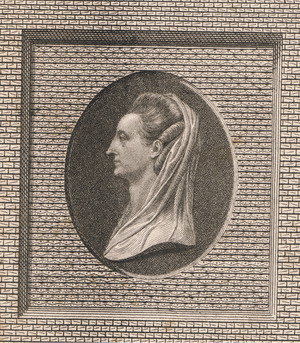
Elizabeth Montagu wrote many letters to her friends and others. These letters discussed her health, travel plans, and social events. About a third of her letters focused on culture, like theater, opera, and moral ideas. History was a topic she discussed often.
She wrote most frequently to her sister, Sarah Scott, and her friends, Elizabeth Carter and Gilbert West. Elizabeth Montagu strongly supported Elizabeth Carter, even though Carter was from a lower social class. Montagu respected Carter's skills and good character.
Gilbert West influenced Montagu's ideas about religion, history, and literature. For a time, he also affected her writing style.
Montagu also wrote often to George Lyttelton about literature and history. This friendship led him to include her works in his Dialogues of the Dead.
Lady Margaret Harley was a lifelong friend of Montagu's. Montagu shared her thoughts about marriage with Lady Margaret.
A collection of Montagu's letters was first published in 1809 by her nephew, Matthew Montagu. Another edition was released in 1906. These collections show Montagu's views on the social world, including fashion, politics, and important people.
Images for kids
See also
 In Spanish: Elizabeth Montagu para niños
In Spanish: Elizabeth Montagu para niños
 | Roy Wilkins |
 | John Lewis |
 | Linda Carol Brown |


